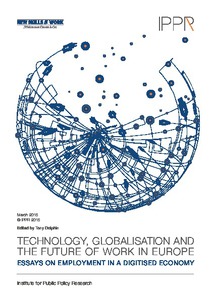Technology, globalisation and the future of work in Europe: essays on employment in a digitised economy
"The purpose of this collection of essays is to highlight the most likely trends in employment across Europe over the next 10 years, and to find out how experts think policymakers, firms and individuals should respond. The industrial structure of European economies and the types of occupation t...
| Institution: | ETUI-European Trade Union Institute |
|---|---|
| Format: | TEXT |
| Language: | English |
| Published: |
London
2015
IPPR |
| Subjects: | |
| Online Access: | https://www.labourline.org/KENTIKA-19108731124919269139-Technology,-globalisation-and-.htm |
| Summary: | "The purpose of this collection of essays is to highlight the most likely trends in employment across Europe over the next 10 years, and to find out how experts think policymakers, firms and individuals should respond.
The industrial structure of European economies and the types of occupation that they support are changing. This change takes many forms in different national contexts, but there are some common themes. There has been an increase in service-sector employment, both in low-skilled customer service work and in high-skilled 'knowledge' occupations, and a corresponding drop in manufacturing employment. This has contributed to a 'polarisation' of the workforce in many countries, with more high-skill and low-skill jobs but fewer requiring mid-level skills. At the same time, young people are finding it increasingly hard to get a foothold in the labour market, and the proportion of the workforce employed on full-time, permanent contracts has shrunk.
Some of the changes are cyclical, the result of recession followed by a stuttering recovery. The rise in temporary work, for example, might be expected to recede when European economies are again growing strongly enough to bring unemployment down towards its pre-recession level. Other changes, however, are the result of major structural forces operating in the global economy: the rapid pace of technological innovation, globalisation and demographic change. These forces are likely to continue to cause dislocation and disruption in European labour markets for the foreseeable future. As a result, there will be a fundamental shift in the types of jobs that are available for workers and in the skills demanded by employers across Europe. Understanding the likely changes in the European labour market over the next decade is essential if policymakers and firms are to set Europe onto a path towards permanently lower unemployment through the creation of many more well-paid jobs. ..." |
|---|---|
| Physical Description: | 124 p. Digital |

